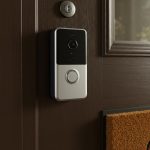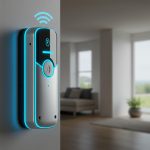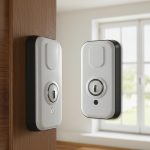[Check Latest Arrivals alarm door sensor on Amazon.]
# Alarm Door Sensor: The Complete 2026 Buyer’s Guide
Are you looking to beef up your home security in 2026? You’ve come to the right place! In this complete buyer’s guide, we’ll delve into everything you need to know about alarm door sensors. From the different types available to the key features you should look for, we’ve got you covered. Whether you’re a seasoned security expert or a newbie just starting out, this guide will help you find the perfect alarm door sensor to keep your home safe and sound.
[Explore Top Rated alarm door sensor on Amazon.]
## Why You Need an Alarm Door Sensor
An alarm door sensor is a simple yet effective way to enhance your home security. It acts as a first line of defense, alerting you to any unauthorized entry attempts. Here’s why it’s a must-have:
* **Deterrent:** The presence of an alarm door sensor can deter potential burglars from even attempting a break-in.
* **Immediate Alert:** Get instant notifications on your smartphone or hear a loud alarm sound the moment a door is opened unexpectedly.
* **Enhanced Security:** Protect your family, belongings, and peace of mind by adding an extra layer of security to your home.
* **Affordable Security:** Alarm door sensors are relatively inexpensive compared to comprehensive security systems, making them accessible to a wide range of homeowners.
* **Easy Installation:** Most alarm door sensors are easy to install, requiring minimal tools and effort.
* **Peace of Mind:** Knowing that your doors are protected gives you peace of mind whether you are home or away.
[Explore Top Rated alarm door sensor on Amazon.]
## Types of Alarm Door Sensors
Choosing the right type of alarm door sensor is crucial for effective security. Here’s a breakdown of the most common types:
* **Wireless Door Sensors:** These sensors communicate wirelessly with a central hub or control panel. They are easy to install and offer flexibility in placement.
* **Wired Door Sensors:** Wired sensors are connected directly to a security system, providing a reliable and secure connection. They are often used in more comprehensive security setups.
* **Magnetic Contact Sensors:** This is the most common type of door sensor. It consists of two parts: a magnet and a sensor. When the door is closed, the magnet is close to the sensor, completing the circuit. When the door opens, the magnet moves away, breaking the circuit and triggering the alarm.
* **Recessed Door Sensors:** These sensors are installed flush with the door frame, making them less visible and more aesthetically pleasing.
* **Vibration Sensors:** These sensors detect vibrations caused by forced entry and trigger an alarm. They are particularly useful for doors that might be vulnerable to being kicked in.
* **Glass Break Sensors:** While not strictly door sensors, they often complement them. These sensors detect the sound of breaking glass, alerting you to potential entry through glass doors or windows.
[Explore Top Rated alarm door sensor on Amazon.]
## Key Features to Look for in a 2026 Alarm Door Sensor
With so many alarm door sensors on the market, it’s essential to know what features to prioritize. Here’s a comprehensive list of features to consider:
* **Wireless Connectivity:** Opt for sensors that connect to your home Wi-Fi for remote monitoring and notifications.
* **Smartphone Integration:** Ensure the sensor is compatible with a smartphone app for easy control and alerts.
* **Adjustable Sensitivity:** Look for sensors with adjustable sensitivity settings to minimize false alarms.
* **Tamper Protection:** Choose sensors with tamper protection features that trigger an alarm if someone tries to remove or disable them.
* **Long Battery Life:** Select sensors with long battery life to minimize the need for frequent battery replacements.
* **Easy Installation:** Make sure the sensor is easy to install, even for non-DIYers. Look for models with adhesive backing or simple mounting hardware.
* **Integration with Smart Home Systems:** If you have a smart home system (like Alexa, Google Home, or Apple HomeKit), choose sensors that can integrate seamlessly.
* **Real-time Notifications:** The sensor should provide real-time notifications to your smartphone or other devices when a door is opened or closed.
* **Customizable Alerts:** Look for sensors that allow you to customize alert settings, such as the type of notification and the sound of the alarm.
* **Event History:** Check for sensors that keep a log of door openings and closings, allowing you to review past activity.
* **Geofencing:** Some advanced sensors offer geofencing capabilities, which trigger alerts when a door is opened or closed within a specified radius of your home.
* **Voice Control:** Select sensors that can be controlled using voice commands via your smart home assistant.
* **Weather Resistance:** If you plan to use the sensor on an exterior door, make sure it’s weather-resistant to withstand the elements.
* **Encryption:** Choose sensors that use encryption to protect your data and prevent unauthorized access.
* **Low Battery Alerts:** The sensor should provide alerts when the battery is running low, so you can replace it promptly.
* **Siren Volume:** For sensors with built-in sirens, check the volume level to ensure it’s loud enough to deter intruders.
* **Delayed Entry Feature:** Some sensors offer a delayed entry feature, which allows you a few seconds to disarm the system before the alarm sounds.
* **Pet-Friendly Settings:** If you have pets, look for sensors with pet-friendly settings to minimize false alarms caused by your furry friends.
* **Remote Monitoring:** Some sensors come with professional monitoring services that can dispatch emergency responders if an alarm is triggered.
* **Two-Way Communication:** Two-way communication allows you to speak with a monitoring center representative through the sensor in case of an emergency.
[Explore Top Rated alarm door sensor on Amazon.]
## Top Alarm Door Sensors to Consider in 2026
Here are some specific alarm door sensors you might want to consider, based on current market trends (projected forward to 2026):
1. **Ring Alarm Contact Sensor (2nd Gen)**
* **Best For:** Simple Home Security Integration
* **Key Features:** Works seamlessly with the Ring Alarm system, offers real-time notifications, easy to install.
* **Why We Like It:** This sensor integrates effortlessly with the Ring ecosystem, providing reliable and instant alerts to deter intruders. The slim design allows for easy installation on any door or window frame, and the long battery life ensures continuous protection. Its integration with Ring’s professional monitoring service offers an added layer of security.
2. **SimpliSafe Entry Sensor**
* **Best For:** Comprehensive Security Systems
* **Key Features:** Wireless, easy to install, works with the SimpliSafe security system, long battery life.
* **Why We Like It:** The SimpliSafe Entry Sensor is a breeze to set up and its compatibility with the SimpliSafe system means you get a fully monitored security setup. This sensor delivers reliable security without the need for professional installation, and it is specifically designed to seamlessly integrate into SimpliSafe’s wider ecosystem.
3. **ecobee SmartSensor for Doors and Windows**
* **Best For:** Smart Home Enthusiasts
* **Key Features:** Integrates with ecobee smart thermostats, detects occupancy, provides alerts for open doors and windows, easy to install.
* **Why We Like It:** This ecobee sensor not only secures your doors and windows, but also adjusts your thermostat settings based on occupancy, enhancing energy efficiency. Set up is straightforward, and its integration with the ecobee ecosystem means a more streamlined smart home experience, from security to climate control.
4. **Sensky Magnetic Door Alarm**
* **Best For:** Affordability and Simplicity
* **Key Features:** Low cost and easy to install with included adhesive. Loud 90dB alarm will deter burglars. Easy to use and operate.
* **Why We Like It:** This alarm is perfect for those who need something easy to set up without having to involve entire smart systems. Simply stick it to any door or window for immediate basic protection. It’s great for rentals and temporary solutions.
[Explore Top Rated alarm door sensor on Amazon.]
## Installation Tips for Your Alarm Door Sensor
Installing your alarm door sensor correctly is crucial for its effectiveness. Here are some general tips:
* **Clean the Surface:** Before attaching the sensor, clean the door frame and door surface with rubbing alcohol to ensure a strong adhesive bond.
* **Positioning:** Place the sensor and magnet close together, but not touching. Refer to the manufacturer’s instructions for the optimal gap distance.
* **Test the Sensor:** After installation, test the sensor by opening and closing the door to ensure it triggers the alarm or sends a notification to your smartphone.
* **Conceal the Wires:** If you’re installing a wired sensor, conceal the wires to prevent tampering and maintain a clean appearance.
* **Secure the Sensor:** Use screws or strong adhesive to secure the sensor to the door and frame.
* **Read the Instructions:** Always read and follow the manufacturer’s instructions for proper installation and setup.
[Explore Top Rated alarm door sensor on Amazon.]
## Pro-Tips and Common Mistakes to Avoid
* **Don’t Block the Sensor:** Make sure there are no obstructions that could interfere with the sensor’s operation.
* **Replace Batteries Regularly:** Check the battery life of your sensors regularly and replace them as needed to ensure continuous protection.
* **Test Your Sensors Regularly:** Regularly test your sensors to make sure they are functioning correctly.
* **Consider Professional Monitoring:** If you want added security, consider a security system with professional monitoring. This will provide 24/7 protection and dispatch emergency personnel if an alarm is triggered.
* **Don’t Rely Solely on Door Sensors:** Door sensors are a great first line of defense, but don’t rely solely on them. Consider adding other security measures, such as window sensors, motion detectors, and security cameras.
* **Keep Software Updated:** To maintain optimal performance, keep the sensor’s software and firmware updated.
* **Check for Recalls:** Stay informed about product recalls, and replace any recalled sensors promptly.
* **Check Wi-Fi Reliability:** Having a reliable Wi-Fi network is crucial for the continuous, uninterrupted operation of your wireless door sensor.
[Explore Top Rated alarm door sensor on Amazon.]
## FAQ Section
**Q: How often should I replace the batteries in my alarm door sensor?**
*A:* Battery life varies depending on the sensor and usage. Typically, batteries should be replaced every 6-12 months. Many sensors will provide a low-battery warning, but regular checks are a good idea.
**Q: Can alarm door sensors be used on windows?**
*A:* Yes, most alarm door sensors can also be used on windows. Simply install the sensor on the window frame and the magnet on the window itself.
**Q: Are alarm door sensors easy to install?**
*A:* Yes, most alarm door sensors are designed to be easy to install, even for non-DIYers. Many models come with adhesive backing or simple mounting hardware.
**Q: Can I integrate alarm door sensors with my smart home system?**
*A:* Yes, many alarm door sensors are compatible with popular smart home systems like Alexa, Google Home, and Apple HomeKit.
**Q: What happens if the power goes out?**
*A:* Most alarm door sensors have battery backup, so they will continue to function even if the power goes out.
**Q: Can pets trigger alarm door sensors?**
*A:* Some advanced sensors have pet-friendly settings that can minimize false alarms caused by pets.
**Q: Do alarm door sensors require a monthly subscription fee?**
*A:* Some alarm door sensors require a monthly subscription fee for professional monitoring services, while others do not.
**Q: Can alarm door sensors be used in apartments?**
*A:* Yes, alarm door sensors can be used in apartments, as long as you have permission from your landlord.
**Q: How loud are the alarms on alarm door sensors?**
*A:* The volume of the alarms varies depending on the sensor. Most sensors have alarms that are loud enough to deter intruders and alert you to a break-in.
**Q: How do I choose the right alarm door sensor for my needs?**
*A:* Consider the type of door, your budget, your desired features, and your existing security system when choosing an alarm door sensor.
[Explore Top Rated alarm door sensor on Amazon.]
## Conclusion
Choosing the right alarm door sensor is a crucial step in protecting your home and loved ones. By considering the types of sensors, key features, and installation tips outlined in this guide, you can make an informed decision and enhance your home security in 2026. Don’t wait until it’s too late – invest in an alarm door sensor today and enjoy the peace of mind that comes with knowing your home is protected! With the information provided, you are now well equipped to find the perfect alarm door sensor for your apartment, home, condo or any other space, giving you security wherever you need it.
[Shop Budget-Friendly alarm door sensor on Amazon.]
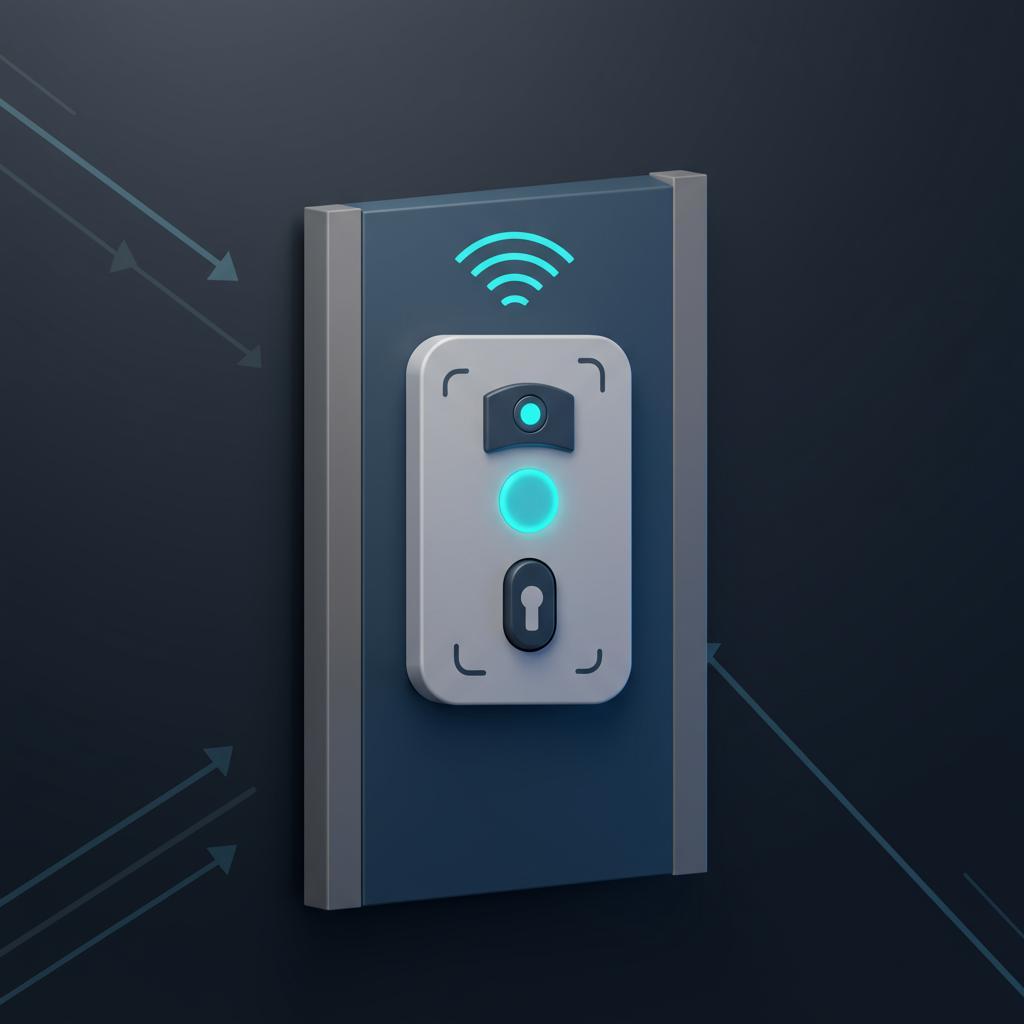
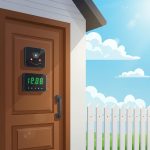
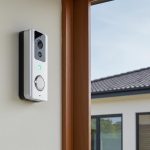

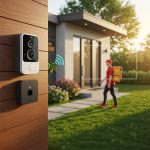
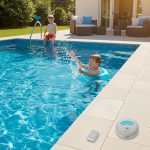
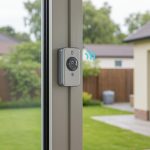
![Door Alarm When Door Opens: Is It Right for *Your* Home? [2026 Guide]](https://www.bestsecuritysystemsreviews.com/wp-content/uploads/2025/10/2507-door-alarm-when-door-opens-is-it-right-for-your-home-2026-guide-150x150.png)
